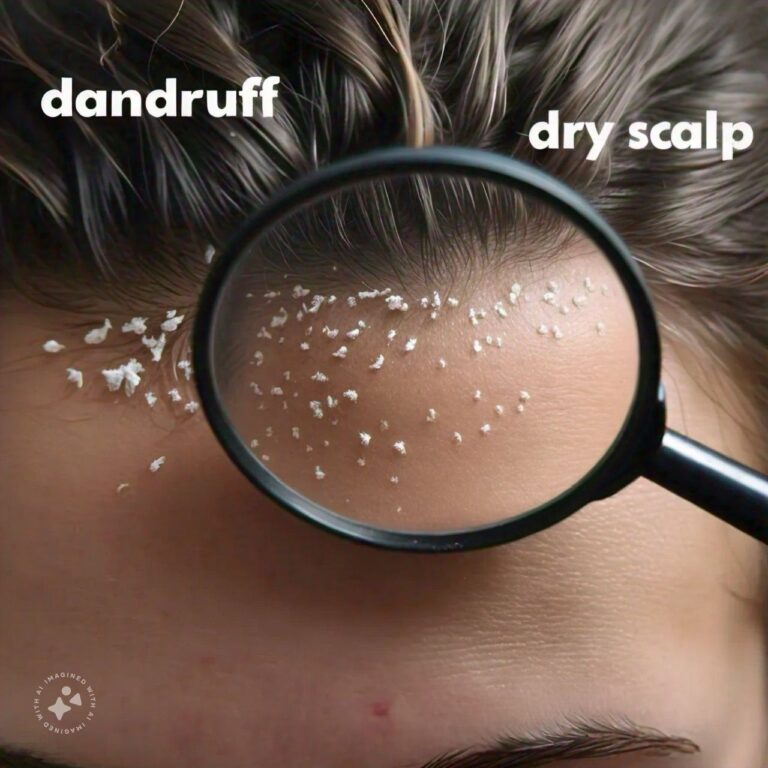
Differences Between Dandruff and Dry Scalp
Dandruff and dry scalp are common scalp conditions that affect a significant number of people worldwide. Although they share some similar symptoms, such as flaking and itching, they have different causes, treatments, and characteristics. Understanding the difference between dandruff and dry scalp is crucial in choosing the right treatment and managing the condition effectively. Let’s dive into the details of these two conditions and explore their causes, symptoms, treatments, and frequently asked questions.
Dandruff Overview
What is Dandruff?
Dandruff is a common scalp condition characterized by the shedding of dead skin cells in the form of white or yellowish flakes. It is not caused by dryness but rather an excess of oil on the scalp. The excess oil causes the skin cells to build up and shed prematurely, which results in visible flakes. In most cases, dandruff is caused by an overgrowth of a yeast-like fungus called Malassezia, which thrives on the oils produced by the scalp.
Causes of Dandruff:
- Seborrheic Dermatitis: This is one of the leading causes of dandruff and is associated with excessive oil production. It leads to redness, greasy patches, and flaky skin, not just on the scalp but also on other areas of the body such as the eyebrows, sides of the nose, and behind the ears.
- Malassezia: This yeast is naturally found on the scalp, but in some people, it can grow excessively, feeding on the oils (sebum) produced by hair follicles. This overgrowth triggers an inflammatory response that leads to an increase in skin cell turnover and dandruff formation.
- Sensitivity to Hair Products: Some people are sensitive to certain hair care products, leading to contact dermatitis. The scalp may react to chemicals in shampoos, conditioners, or styling products, which can trigger flakiness and itching.
- Infrequent Hair Washing: Not washing your hair enough can cause oil and skin cells to accumulate, which may contribute to dandruff.
- Climate: Cold, dry air or seasonal changes can worsen dandruff for some individuals. Humidity and heat, on the other hand, may also contribute to oil buildup on the scalp.
Symptoms of Dandruff:
- White or yellowish flakes on the scalp, hair, or shoulders
- Itchy scalp
- Oily or greasy patches on the scalp
- Redness and irritation on the scalp
Treatment of Dandruff:
Treating dandruff typically involves using medicated shampoos and addressing the underlying causes. Some effective treatments include:
- Anti-Dandruff Shampoos: These often contain active ingredients like pyrithione zinc, selenium sulfide, ketoconazole, or coal tar. These ingredients help reduce yeast levels, soothe inflammation, and slow down the shedding of skin cells.
- Tea Tree Oil: Known for its antifungal and anti-inflammatory properties, tea tree oil can help manage dandruff caused by fungal overgrowth.
- Salicylic Acid: This helps exfoliate the scalp and remove excess skin cells.
- Lifestyle Changes: Washing hair regularly with a gentle shampoo to remove excess oil and dead skin cells, reducing the use of harsh hair products, and managing stress (which can exacerbate dandruff) are also important measures.
- Dietary Changes: Eating a balanced diet rich in vitamins and minerals can improve skin health and potentially reduce dandruff.
Dry Scalp Overview
What is Dry Scalp?
Dry scalp is a condition where the scalp does not produce enough natural oils to keep the skin moisturized. As a result, the scalp becomes dry, flaky, and irritated. Unlike dandruff, dry scalp flakes are usually smaller and less oily. Dry scalp is often caused by external factors like harsh weather conditions or the use of certain hair care products that strip the scalp of its natural oils.
Causes of Dry Scalp:
- Cold Weather: Dry scalp is more common in the winter months when the air is cold and dry. The lack of moisture in the environment can cause the skin to lose hydration, leading to a dry scalp.
- Over-Washing: Frequent washing of hair with harsh shampoos can strip the scalp of its natural oils, leading to dryness.
- Hot Water: Using excessively hot water to wash your hair can remove moisture from the scalp and dry it out.
- Skin Conditions: Conditions like eczema and psoriasis can cause the scalp to become dry, irritated, and flaky.
- Age: As people age, their skin tends to become drier, including the scalp.
Symptoms of Dry Scalp:
- Small, white flakes
- Tight or uncomfortable feeling on the scalp
- Itchiness
- Dryness and irritation
- Sensitivity to hair care products
Treatment of Dry Scalp:
Treating dry scalp focuses on restoring moisture to the scalp and preventing further dryness. Some effective treatments include:
- Moisturizing Shampoos and Conditioners: These products are designed to add moisture back into the scalp and hair. Look for ingredients like glycerin, aloe vera, and coconut oil.
- Oils: Natural oils like coconut oil, argan oil, or olive oil can be massaged into the scalp to provide hydration and nourishment.
- Limit Hair Washing: Reducing the frequency of hair washing and using lukewarm water instead of hot water can help prevent the scalp from drying out.
- Humidifiers: Using a humidifier in your home, especially during the winter, can add moisture to the air and prevent dry skin, including the scalp.
- Gentle Hair Care Products: Avoid products with harsh chemicals, alcohol, or sulfates, as these can further dry out the scalp.
Differences Between Dandruff and Dry Scalp
Although dandruff and dry scalp share some symptoms, such as itching and flaking, they are different conditions with distinct causes and treatments. Here’s a breakdown of the key differences:
- Cause:
- Dandruff: Caused by excess oil production and the overgrowth of Malassezia yeast on the scalp. Other factors like seborrheic dermatitis and product sensitivity can also trigger dandruff.
- Dry Scalp: Caused by a lack of moisture in the scalp, often due to environmental factors, over-washing, or using harsh products.
- Flakes:
- Dandruff: Flakes are larger, oilier, and can be yellowish or white. They are often accompanied by redness and irritation.
- Dry Scalp: Flakes are smaller, white, and less greasy.
- Scalp Condition:
- Dandruff: The scalp is often oily and greasy.
- Dry Scalp: The scalp feels tight, dry, and uncomfortable.
- Treatment:
- Dandruff: Requires antifungal treatments, anti-dandruff shampoos, and sometimes lifestyle changes to reduce oil production.
- Dry Scalp: Focuses on moisturizing the scalp, avoiding harsh products, and limiting exposure to cold, dry air.
Conclusion
In conclusion, while dandruff and dry scalp share some overlapping symptoms like flaking and itching, they are distinct conditions with different underlying causes. Dandruff is usually the result of excess oil and a fungal overgrowth, while dry scalp is due to a lack of moisture. Proper diagnosis and treatment are key to managing these conditions effectively. Medicated shampoos, lifestyle changes, and moisturizing products can help alleviate symptoms and promote scalp health. Understanding the difference between the two conditions will lead to better treatment choices and a healthier scalp.
FAQs
Related Topics
- All
- Animals
- Diseases
- Health
- Money
- Politics
© 2024 OnYelp.com. All rights reserved. Terms and Conditions | Contact Us | About us





